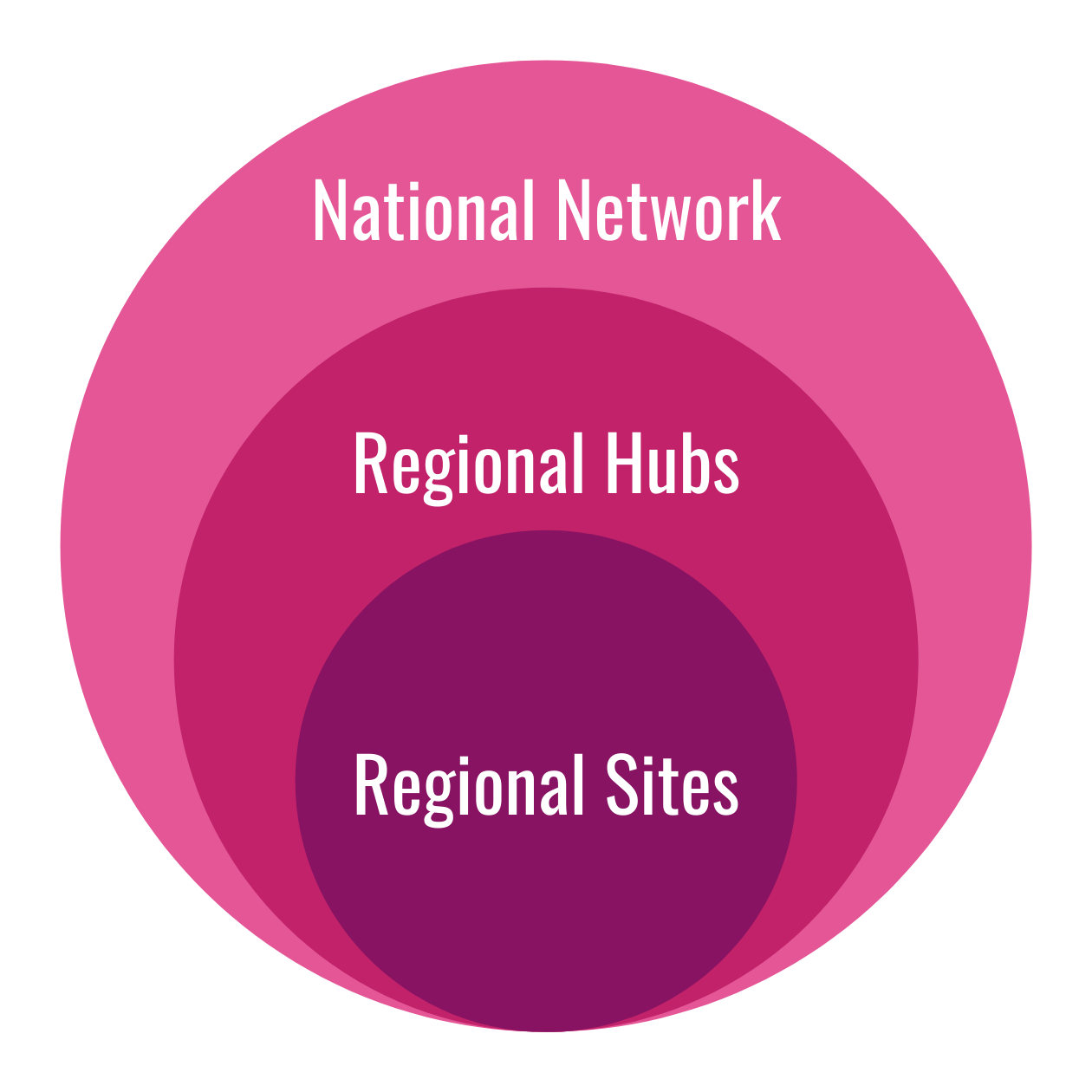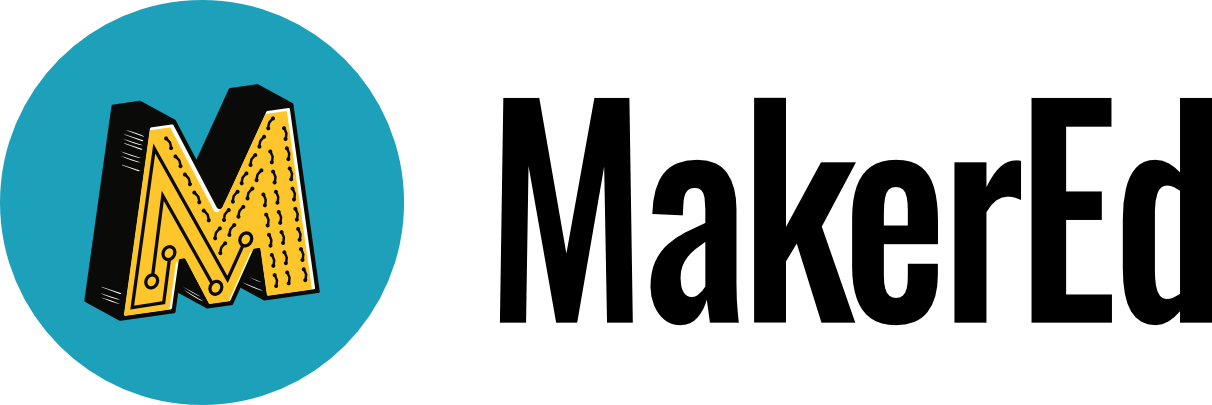Making Spaces seeks to sustainably integrate making and equity into learning environments across the country. Since 2016, Maker Ed has guided 36 regional networks to design and facilitate professional development around maker-centered learning in their communities. This helps organizations to build a foundation for more equitable education. We focus on four core areas: culture, pedagogy, equity, and community, with an emphasis on identity and capacity building.
To do this, Making Spaces uses a layered model of support. Over the program’s 33 months, Maker Ed guides a cohort of Regional Hubs to learn, explore and be challenged as they in turn assist Sites in their vicinity. Regional Hubs provide Sites with the help they need to jumpstart and sustain maker education through professional development, tools, resources, and community engagement. Our goal is to link support systems for educators so that they can transform youth learning through making.
Program Overview
In each Making Spaces Cohort, Maker Ed works with 5 – 10 Regional Hubs on four core areas: culture, pedagogy, equity, and community with an emphasis on identity and capacity building. Each Regional Hub provides professional development and programmatic partnership to 5 – 10 sites in their areas.

What is the difference between a ‘Regional Hub’ and a ‘Site’?
Examples of both Regional Hubs and Sites might include: libraries, colleges, museums, cultural centers or schools. Both types should provide direct instruction to learners. Hubs must also provide professional development for other educators. In alignment with our focus on equity, organizations should fit Maker Ed’s priority audiences.
A Regional Hub is an organization that acts as a leader, trainer, and guide for multiple local institutions. Hubs support Sites as they integrate making into their learning environments.
Each Regional Hub identifies and works with a cohort of 5-10 Sites in their local area. Sites deliver content directly to learners.
We prioritize supporting organizations that:
- Have multiple staff who identify as BIPOC, disabled, LGBTQ+, and/or undocumented. and/or
- Work primarily with educators who identify as BIPOC, disabled, LGBTQ+, and/or undocumented. and/or
- Work primarily with youth who identify as BIPOC, disabled, LGBTQ+, and/or undocumented. and
- Actively commits to equity and justice in their practice.
How Maker Ed supports Regional Hubs
Maker Ed supports the work of Regional Hubs by offering guidance on how to deepen their practice in maker-centered learning and ways to increase the impact of each of the Hubs. The Making Spaces program provides tools, resources, a national community and ongoing support as Regional Hubs develop their own model for professional development and work with a cohort of Sites.
Maker Ed works with Regional Hubs on culture, pedagogy, equity, and community:
- Culture
- Establish or refine program vision
- Draft or revise program values
- Create a more inclusive organization
- Pedagogy
- Introduce and strengthen maker-centered mindsets
- Engage with maker-centered pedagogical strategies
- Craft lessons or activities within a maker-centered framework
- Equity
- Implement anti-racist and anti-oppression tools
- Integrate liberatory and equity focused teaching practices
- Incorporate culturally restorative pedagogy
- Community
- Develop funding strategies
- Build programming capacity
- Increase engagement and relevance with their local community
What are the requirements of a Cohort?
- Attend a Cohort Kickoff – Welcome call and weekly intensive workshops held virtually.
- Plan for an In-Person Intensives – Two Fall workshops. Hubs schedule and cover their own travel expenses for each of these workshops (Hubs should estimate $2000 for travel expenses to cover two people from their organization to attend each in-person workshop.)
- Participate in monthly virtual meetings with the entire cohort
- Monthly contributions to the Making Spaces online community
- Participate in Affinity Groups – Examine personal identity and culture to build collective vocabulary around equity and justice
- Complete Hub-specific surveys and support the completion of local Site surveys up to three times a year
- Prepare and share portfolio that showcases work with Sites
- Participate in Making Spaces Instagram- Prepare content to be showcased
- Read and Discuss Core Texts – (One copy of each text provided by Maker Ed)
Optional Elements
- Participation in monthly virtual Community Calls
- Additional Learning Opportunities – (Maker Ed Workshops and Convening)
How Regional Hubs Support Sites
Each Hub identifies 5-10 Sites to partner with for the Making Spaces program. Sites could be schools, cultural sites, libraries or other organizations that provide educational experiences to learners. All sites must fit into one of Maker Ed’s priority audiences as outlined above. Hubs assist Sites in the following ways:
- Create a site specific vision and plan to support sustainable integration of making education.
- Help communicate this vision to their local stakeholders.
- Build and sustain community amongst their fellow sites.
- Document Hub work and Site work, including through social media.
Check out our blog for a few examples:
- Growing Maker Education in the Midwest, Jamie Thompson
- Launching Making Spaces Crowdfunding Campaigns, Julia Petraglia
- Read more Hub Highlights
Testimonials
The Making Spaces program and the partnership with Maker Ed, has legitimized for us something that we’re already passionate about, and given us a much stronger network, and a tremendous amount of support materials from the staff to the tools that we get to the network and the insight or an in person visits with previous cohorts.”
— BLDG 61, Boulder Public Library, Boulder, COThe meetings each month do help keep me focused on the project. I’m also encouraged to continue to engage with our educators as I am reminded about how complex the change process is and how support looks very different for each of our sites.”
— Fort Worth Museum of Science and History, Fort Worth, TXMaking Spaces has increased our visibility in the City of Milwaukee, and increased awareness of our programs and what we offer and the resources that the museum offers.”
— Betty Brinn Children’s Museum, Milwaukee, WIParticipating…has really influenced how we support MCL [Maker-Centered Learning] both for our sites and internally as a community based organization. As we build MCL as a central pillar of learning at X Studio, we hope to continue to support our community.
—Explora, Albuquerque, NM
Membership Costs
The membership fee to participate in Making Spaces is $15,000 per Regional Hub. This cost reflects Maker Ed staffing hours, lifetime access to all specially crafted Making Spaces curriculum, and participation with the national community of Regional Hubs. Organizations may incur additional costs for travel expenses related to in-person workshops to be held in forthcoming years.
Want to participate in Making Spaces, but lack some financial support?
Maker Ed is happy to support your fundraising initiatives. Local foundations and corporations with strong presence in your community are a good place to start looking for resources and funding. You can use this template to make your case as to why Making Spaces participation would benefit your organization and your region overall.
The Maker Ed resource team can help with identifying foundations, advising on proposals, and reviewing grants. Please reach out to our Director of Strategic Partnerships Aubrey Mailliard Rawlins at Aubrey@makered.org, to discuss collaboration options.
Application Timeline
Applications are closed.
Program Details
History:
Since 2016, the Making Spaces program has engaged one cohort of Hubs per year, reaching 36 Hubs, over 250 sites, 450 educators, and an estimated 35,000 youth. Making Spaces began as a collaboration between the Children’s Museum of Pittsburgh (CMP) and was initially funded by Google’s Making & Science Initiative. The work of these Regional Hubs shows that when communities collaborate and have support to build capacity, deep and lasting change is possible. Organizations that participated in Making Spaces have deepened their practice and impact. They increased their efforts through replication and built a local community of educators that share their practice. Read further testimonials:
Being a part of the Making Spaces program has dramatically changed how Madison Public Library thinks about working with teachers and with educators. Our main goal is to offer capacity-building opportunities to educators and to also connect educators to each other, to other learners, makers, and artists around the city. None of that would have been possible without the guidance that Making Spaces provided for us.”— The Bubbler, Madison Public Library, Madison, WI
We have so many [school] districts, but even though they’re right next to each other … they don’t talk normally … [Through engagement with Making Spaces] they learned from each other and shared ideas and I don’t think they would have done that AT ALL, so that was a really strong impact.”- Sonoma County Office of Education, Sonoma, CA
The Making Spaces Community
Regional Hubs & Sites
This map shows the locations of all Hubs and Sites. Read more about Making Spaces partners in our blog.
Cohort 5 Hubs (2021-2023)
- The 29th Street Community Center (Strong City Baltimore) – Baltimore, MD
- Virginia Tech Washington D.C. Metro Area STEAM Education and Workforce Development Labs (VT DC STEM Labs) – Falls Church, VA
- Imagine Foundry – Cookeville, TN
- AIMS Center for Math and Science Education – Fresno, CA
- Children’s Creativity Museum – San Francisco, CA
- (learn more)
Cohort 4 Hubs (2020-22)
- Moonlighter FabLab, Inc. – Miami, FL
- New Castle Area School District and Matt’s Maker Space Foundation – New Castle, PA
- Wayne RESA – Wayne, MI
- Decatur Makers – Decatur, GA
- Northcentral Technical College – Wausau, WI
- Knock Knock Children’s Museum – Baton Rouge, LA
- Explora Science Center & Children’s Museum of Albuquerque – Albuquerque, NM
- The University of Montana spectrUM Discovery Area – Missoula, MT
- Folsom Lake College Innovation Center – Sacramento, CA
- Agency by Design Oakland – Oakland, CA
- (learn more)
Cohort 3 Hubs (2018-20)
- Indiana University School of Education MILL Makerspace – Bloomington, IN
- Idaho STEM Action Center – Boise, ID
- BLDG 61 at Boulder Public Library – Boulder, CO
- ideaLABS at Denver Public Library – Denver, CO
- Fab Lab Houston at BakerRipley – Houston, TX
- El Garage Project Hub – Mexicali, Mexico
- (learn more)
Cohort 2 Hubs (2017-19)
- Betty Brinn Children’s Museum – Milwaukee, WI
- Digital Harbor Foundation – Baltimore, MD
- Fort Worth Museum of Science and History – Fort Worth, TX
- Science Museum of Minnesota – St Paul, MN
- Sonoma County Office of Education – Santa Rosa, CA
- (learn more)
Cohort 1 Hubs (2016-18)
- Children’s Museum of Pittsburgh – Pittsburgh, PA
- Maker Ed – Oakland, CA (worked virtually with non-co-located schools)
- The Scott Family Amazeum – Bentonville, AR
- KID Museum – Bethesda, MD
- Edventure Children’s Museum – Columbia, SC
- Montshire Museum of Science – Norwich, VT
- Albemarle County Public School District – Charlottesville, VA
- Digital Youth Network at DePaul University – Chicago, IL
- San Mateo County Office of Education – Redwood City, CA
- The Bubbler at Madison Public Library – Madison, WI
- (learn more)
Special Thank You To Our Past & Current Funding Partners
- The Cognizant Foundation (Cohorts 4 and 5)
- Google’s Making & Science Initiative (Cohorts 1-3)
Cognizant has provided funding since 2020 for Cohorts 4 & 5. The Cognizant Foundation partners with employers, educators, policymakers and thought leaders to identify workforce needs and develop actionable solutions so that all individuals can benefit from the global digital economy. Since its founding in 2018, the Cognizant Foundation has served historically excluded communities—and those who are underrepresented, underserved and un/underemployed—through the delivery of industry-relevant education, technical skills training programs and critical research needed to modernize the ways we educate and employ our workforce. Working together with our partners, we are committed to advancing true transformation in the years ahead. Learn more at https://www.cognizantusfoundation.org/.
